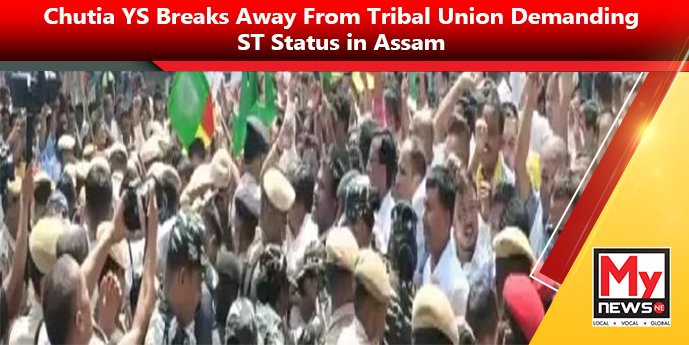Chutia YS Breaks Away From Tribal Union Demanding ST Status in Assam
Guwahati: The Chutia Yuva Sanmilan (CYS) on Monday disbanded the union of the six tribal organisations pushing for their demand amid a fight for Scheduled Tribes (ST) recognition in Assam.
They will reportedly not relent in their desire for ST status. However, they will leave the union due to dissatisfaction with the choices made by it.
The Chutia Yuva Sanmilan made this announcement in a speech to the media.
It should be mentioned that last Thursday, throngs of protesters occupied Guwahati’s Dispur neighbourhood in an effort to draw attention to the Centre’s decision to ignore various Assamese groups while granting Scheduled Tribes (ST) recognition to people from five other states.
Protesters from various parts of Assam converged in Dispur with the intention of gheraoing the state secretariat, calling for the awarding of ST status to communities.
Meanwhile, a sizable police presence was present to keep the gathering under control and prevent any disruption of daily life.
The police had been ordered to stop the Janagosti Oikya Mancha leaders from entering Dispur since they represent six different tribes in the state and are responsible for organising the large-scale protests.
The rallies were called on September 19 by a coalition of the All Moran Students Union, Assam Matak Yuva Chatra Sanmilan, All Tai Ahom Students Union, Chutia Yuva Sanmilan, All Assam Tea Tribe Students Union, and All Koch Rajbongshi Students Union.
They were supposed to discuss the subject with the Chief Minister Himanta Biswa Sarma but they skipped the meetings in order to plan the demonstrations.
Adivasi, Chutia, Koch-Rajbongshi, Matak, Moran, and Tai-Ahom communities receiving ST classification was one of the BJP’s campaign promises made before the 2016 Assembly elections. Together, these communities make up more than 30% of Assam’s electorate.
The inclusion of diverse communities in the ST lists of five states—Chhattisgarh, Tamil Nadu, Karnataka, Himachal Pradesh, and Uttar Pradesh—were approved by the central government on Wednesday earlier this month.
The affected states enthusiastically embraced the decision, which was made at a meeting of the Union cabinet presided by by Prime Minister Narendra Modi.

